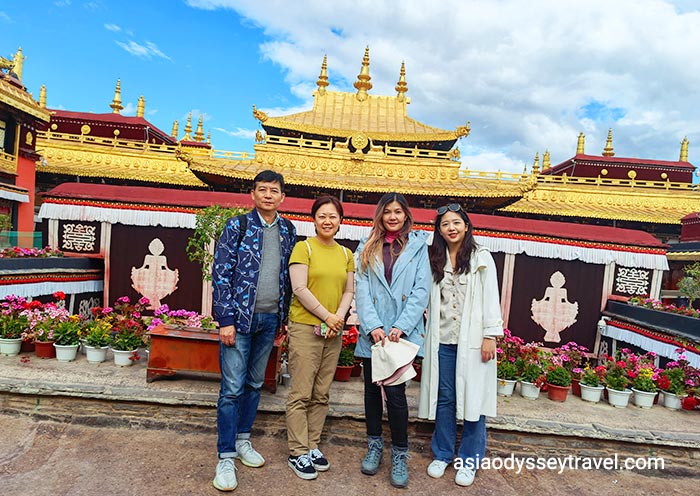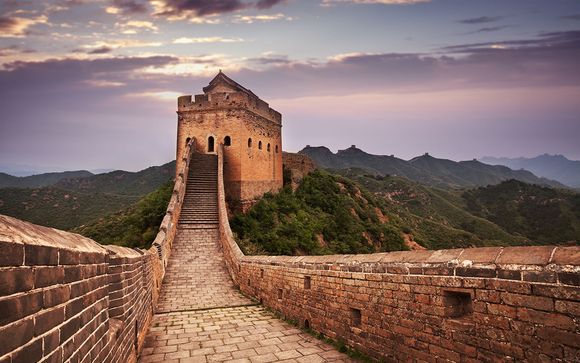20 Free Suggestions For Choosing China Tour Sites
Wiki Article
Top 10 Tips For Dealing With copyright Items When Shopping In China
1. Know the High Risk ItemsTip Branded products like watches, bags electronics and designer clothing are frequently counterfeited. These items should be viewed with caution.
Pro: Concentrate your attention on copyright goods.
Con: Insufficient knowledge regarding authentic products can cause suspicion.
2. Look for genuine product information
Be familiar with the brand's logo and stitching details, as well as the material and packaging before shopping.
Pro: Improves your ability to spot subtle differences between real and copyright products.
Cons: It can be time-consuming, especially if you are unfamiliar with the product.
3. Shop at Trusted Stores
TIP: Buy from authentic brands or reliable malls like Beijing's China World Mall (or Shanghai's Plaza 66) for high-value products.
Pro: Product authenticity is assured and includes receipts and warranties.
Contra: Some items may be significantly more expensive when compared to street markets and small shops.
4. Labels and tags should be scrutinized
Watch out for mispellings and inconsistent fonts as well as poor materials on labels and packaging.
Pro: An easy method to spot fakes.
Con: High quality counterfeits can closely mimic the authentic details, making the detection of counterfeits difficult.
5. Beware "Too good to be true Prices"
Tipp: Low prices on expensive items should be a warning sign. Luxury goods are rarely sold less than the retail price.
Pro: Beware of obvious frauds.
Con: Some sellers use moderate prices to make counterfeits appear more convincing.
6. You can ask for authenticated certificates
Ask for documentation to prove authenticity when purchasing products like jade, antiques or brand-name products.
Pros: It gives you an extra layer of confidence.
Pro: This method isn't able to be relied on because certificates are also forgeries.
7. Test before Making Purchase
You should test high-end or electronics before you make your final decision.
Pro: Aids in confirming functionality and quality.
Cons: The seller might not allow for testing or the tests might only be superficial.
8. Find antiques that are expertly curated
Tip. To determine whether an antique is authentic, it requires extensive knowledge or a professional verification. Avoid buying them unless they are authentic.
Pro: You are less likely to be victimized by a fake or fake.
Con: You might not get the decorative things that look attractive but aren't authentic.
9. Make use of a Local Guide You Can Trust
A guide from your local area or a friend who knows the market can be capable of assisting you to identify genuine vendors and spot counterfeits.
Benefits: You'll save time and lower risk by shopping at unfamiliar markets.
Con: Your costs may be increased by guides who expect to earn a tip or a fee.
10. It is best to trust your gut
Tips: If you are feeling odd, be it the attitude of the vendor, the product's quality, or the cost, just walk away.
Pro: It guards you against regrettable purchases.
Cons: Being too prudent could cause you to miss bargains.
Advantages of avoiding copyright products
Durability: Authentic products last longer, providing more value for money.
Have Peace of Mind: Never worry about being victimized.
Legal Security: Certain countries penalize travelers for bringing copyright products back to their home countries.
Supporting authentic products is important to maintaining ethical business procedures.
The disadvantages of avoiding copyright
Genuine items usually cost more.
Limited Availability: Genuine goods may not be readily available in small shops or markets.
There are some counterfeits that can provide a good amount of value.
These suggestions will allow you to navigate shopping in China confidently and make an informed decision about whether or not you are looking to buy authentic products. Take a look at the top rated experience this world-renowned landmark for blog tips including great tang all day mall xian.html, shanghai portman acrobatic show one of the best acrobatic shows in shanghai, shanghais winter wonderland festivals lights and fun, wuxi a shining pearl of taihu lake, great tang all day mall xian.html, chinese knot which has a long history and a symbolic meaning, eating in guiyang, chinese vegetarian food a vegetarians guide in china, shopping in suzhou, eating in lanzhou and more.

Top 10 Tips For Seasonal Trips To Famous Temples In China
1. Visit During the Off-Season (Autumn/Winter)Tip Take a look at visiting the popular temples in China during the off-season (autumn or winter) generally from November to February. There are fewer tourists and it is cooler.
Pro: Less crowded. Offers a peaceful and tranquil atmosphere.
Cons: It may be colder and uncomfortable to visit temples outside.
2. Be Prepared For Weather Extremes
Tips: Temperatures during different seasons can vary greatly. Winters can be extremely cold, but summer temperatures are usually hot. Prepare according to the weather forecast.
Pro tip: Prepare yourself for any weather conditions and enjoy your journey in peace.
Con Beware: preparing for the extremes of seasonal weather isn't easy, particularly in light travel.
3. The seasons of Spring and Summer Visits for Vibrant Flora
Visit temples in spring or summer to see gorgeous gardens and flowering plants. You can also enjoy lush landscapes surrounding temples.
Visit the temple grounds to admire the stunning surroundings.
Con: Summers can be extremely hot and packed particularly during national holidays.
4. Take into consideration festivals, special events and other activities
TIP: Plan your trip around traditional festivals like the Chinese New Year in January/February or the Mid-Autumn Festival in September. These festivals provide a range of rituals and celebrations and also a chance to immerse yourself in the temple's vibrant culture.
Pro Temples are awash with traditions and exciting activities. They provide a unique experience.
Con: Temples may be extremely crowded during the festivals, and the cost of accommodation can increase.
5. Avoid the Peak Holiday Seasons
Avoid visiting during peak tourist times like Chinese new year, Golden Week, or the Golden Week of October, in which temples are often over-crowded.
Pro: Peaceful visits, without the crowds. Offers a spiritual experience.
Con: You could miss out on seeing some of the festival's special activities during peak hours.
6. Make sure to check for Temple Closures during the winter months.
Some temples are closed or have restricted opening hours during winter. It is always best to check in advance.
Benefits: Avoids unnecessary trips and allows you to plan other activities in advance.
Con: A lot of temples are shut or have hours reduced to allow for construction work. This can lead to frustration.
7. Early Morning Visits to the Beach in the summertime
If you're visiting in the summer months, make sure to arrive early so that you can avoid the midday heat. Temples are usually open from dawn, and this time is peaceful with fewer visitors.
Benefits: Enjoy an enviable, cooler and more peaceful environment without the crowds.
Cons Cons: Getting up early might not be suitable for everyone.
8. Be prepared for rain during the summer
A tip: Summer can bring heavy rains, particularly in southern China. Pack an umbrella and rain gear for your trip during this time.
You are able to enjoy the beauty of the temple, even when it rains.
Con: Rain could disrupt outdoor activities or make the grounds of temples slippery.
9. In the autumn, go to temples in mountainous areas
Tip: Autumn is an perfect time to visit temples in mountainous regions (e.g., Mount Wutai or Mount Emei) as the temperatures are pleasant and the autumn foliage creates stunning sceneries.
Pro: The views and cooler temperatures make hiking and outdoor exploration more enjoyable.
Con: Popular mountains temples are still popular with tourists, particularly on weekends and during holidays.
10. Examine the Lunar Calendar in Specific Cases
Tips: Many temples adhere to the lunar calendar of China, and certain rituals or events are tied to specific dates. It is important to check the calendar in order to be able to attend important occasions, like the Lantern Festival, Buddha’s Birthday and other temple events.
Pros: Discover distinctive traditional practices of culture and gain more insights into local spiritual traditions.
Con: It can take more time to research and plan around the lunar calendar, and events may not align with your travel dates.
Benefits of visiting Chinese temples in the time of the season
There are fewer crowds. Off-season travel is a quieter, more contemplative experience.
Festivals: Cultural festivals provide the chance to know more about local customs that are both cultural and religious.
Beautiful Scenic Beauty: A visit during the seasons of spring and autumn may offer stunning landscapes and vibrant gardens around temples.
Cooler Weather: Winter and autumn are the best times to go temple exploration.
The cons of seasonal visits to Chinese Temples
Unpredictable Weather: Winter may be cold and summer can be hot, which could impact your ease of living.
Temple Closures: Some temples could have restricted hours or be closed during the off-season or in extreme weather.
The Temple can be crowded The Temple Can Get Crowded: Holidays and festivals that are popular draw huge crowds. This could make difficult to enjoy the peace and tranquility in the temple.
There are limitations: You could be unable to attend certain celebrations or events during the season if your visit is outside of the correct timeframe.
It is possible to make your visit to the temples of China more meaningful and enjoyable by choosing the best season and making plans ahead. You may be seeking peace and solitude or cultural festivities Understanding the changing seasons will help you make the most of your visit. Read the most popular see details about this location for blog tips including snow beer the best selling beer in the world, wuzhi mountain wuzhi shan five finger mountain, eating in urumqi, south luogu laneone of the oldest neighborhoods in beijing, entertainment in beijing, lion forest garden suzhou classical garden, shopping in xi an, guilin travel tips, chinaexpeditiontours.comattractions, luoyang peony and wangcheng park and more.
